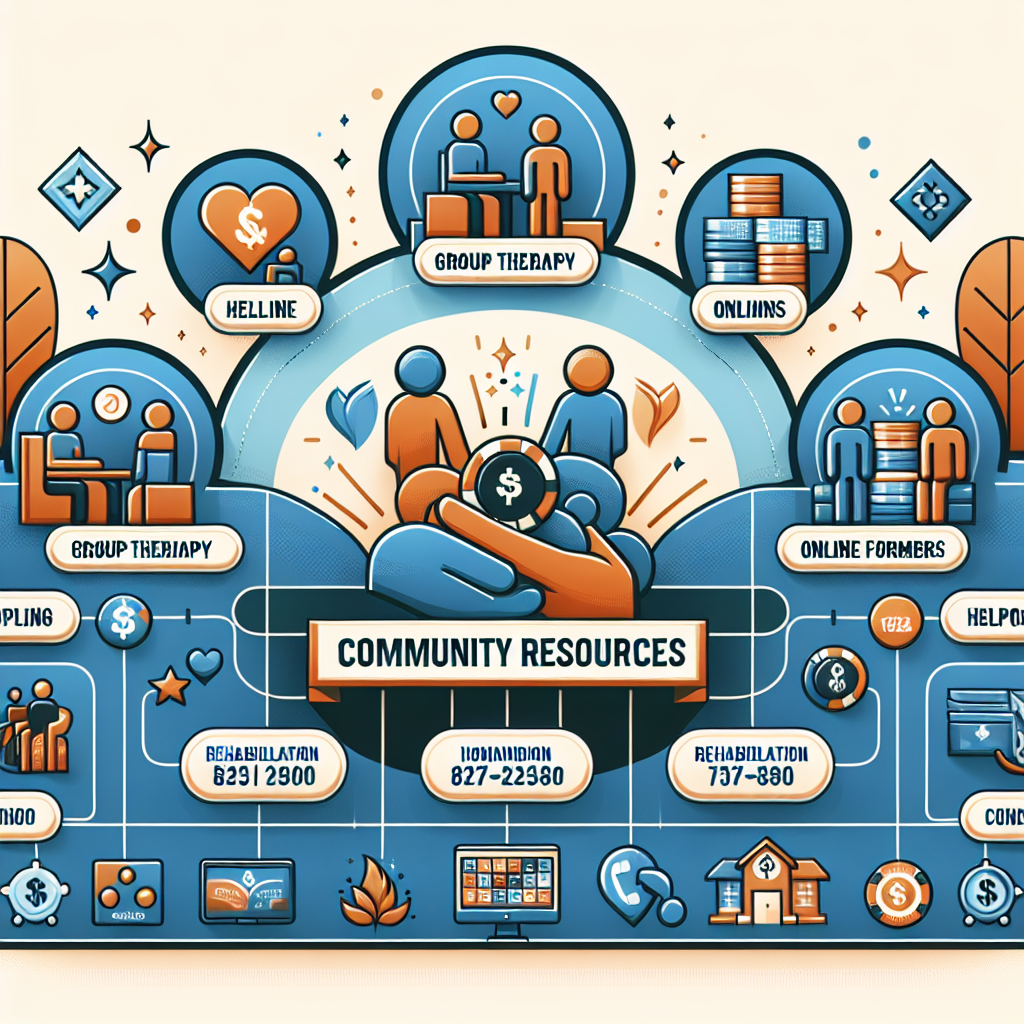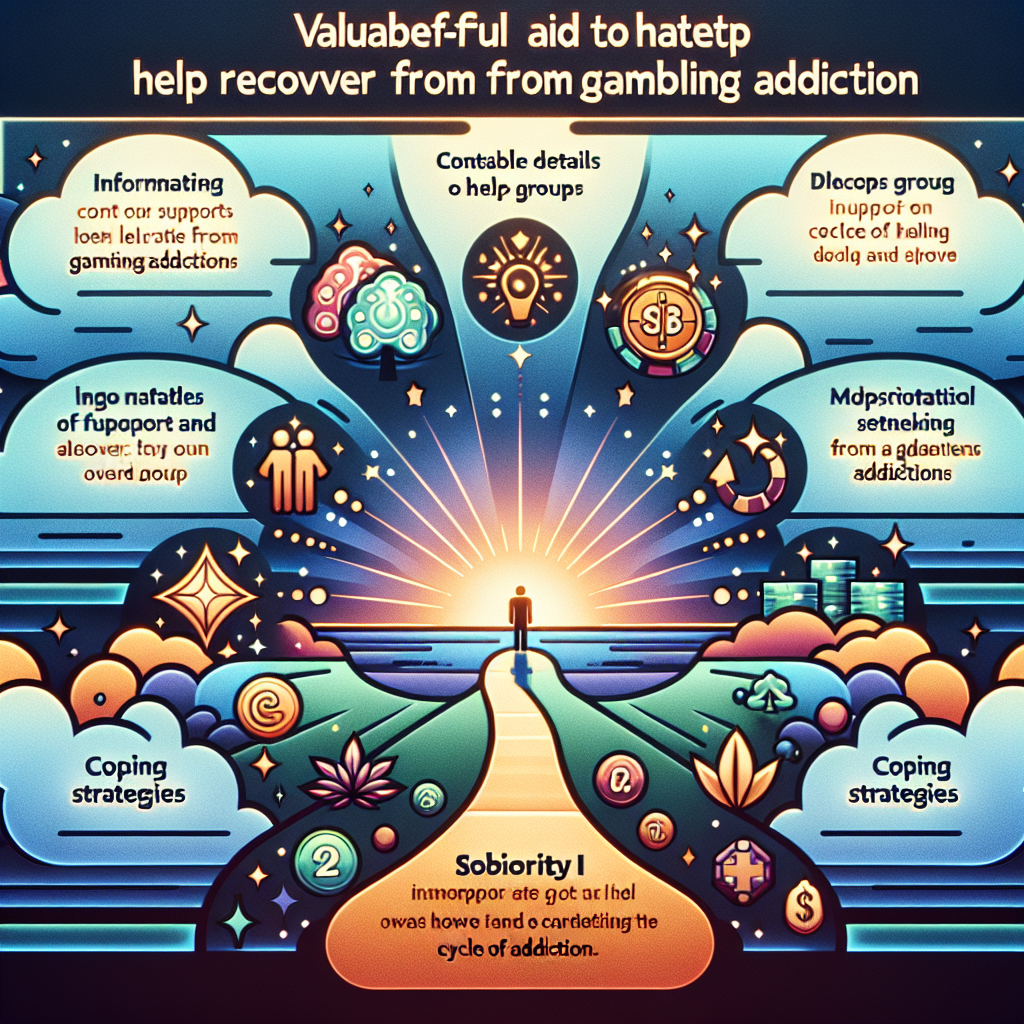-
Table of Contents

“Find Hope and Healing: Community Resources for Gambling Addiction Recovery”
Introduction
Gambling addiction, also known as compulsive gambling or gambling disorder, is a serious condition that can have devastating effects on individuals and their families. Recognizing the need for support and recovery, many communities offer a variety of resources to help those struggling with this addiction. These resources often include counseling services, support groups, hotlines, and educational programs designed to provide the necessary tools and support for individuals to overcome their gambling habits. Additionally, many organizations work to raise awareness about the signs of gambling addiction and the importance of seeking help. By leveraging these community resources, individuals can find the support they need to embark on the path to recovery and regain control over their lives.
Exploring Local Community Resources for Gambling Addiction Recovery
Gambling addiction, often referred to as compulsive gambling or gambling disorder, is a serious issue that affects millions of individuals and their families worldwide. The journey to recovery can be challenging, but it is important to remember that no one has to face this struggle alone. Numerous community resources are available to support those seeking to overcome gambling addiction, offering a lifeline of hope and practical assistance.
One of the most well-known resources for gambling addiction recovery is Gamblers Anonymous (GA). Modeled after the successful Alcoholics Anonymous program, GA provides a supportive environment where individuals can share their experiences and receive encouragement from others who understand their struggles. Regular meetings, both in-person and online, create a sense of community and accountability, which can be crucial for maintaining long-term recovery. The 12-step program used by GA emphasizes personal responsibility, spiritual growth, and mutual support, making it a comprehensive approach to overcoming addiction.
In addition to GA, many local communities offer specialized counseling services for those dealing with gambling addiction. These services often include individual therapy, group therapy, and family counseling. Licensed therapists and counselors who specialize in addiction can help individuals understand the underlying causes of their gambling behavior, develop coping strategies, and rebuild their lives. Family counseling is particularly important, as gambling addiction can strain relationships and create a cycle of stress and conflict. By involving family members in the recovery process, these services aim to heal the entire family unit and foster a supportive home environment.
Furthermore, community health centers and hospitals frequently provide resources for gambling addiction recovery. These institutions may offer outpatient programs, where individuals can receive treatment while continuing to live at home and maintain their daily responsibilities. Outpatient programs typically include a combination of therapy, education, and support groups, providing a well-rounded approach to recovery. For those requiring more intensive care, inpatient programs are also available. These programs offer a structured environment where individuals can focus entirely on their recovery, free from the distractions and temptations of everyday life.
Another valuable resource is financial counseling, which can be crucial for individuals whose gambling addiction has led to significant financial problems. Financial counselors can help individuals create a budget, manage debt, and develop a plan for financial stability. By addressing the financial consequences of gambling addiction, these services can alleviate some of the stress and anxiety that often accompany the recovery process.
Moreover, many communities have non-profit organizations dedicated to helping those affected by gambling addiction. These organizations often provide a range of services, including helplines, educational materials, and support groups. Helplines offer immediate assistance and can connect individuals with local resources, while educational materials help individuals and their families understand the nature of gambling addiction and the steps to recovery. Support groups, similar to those offered by GA, provide a sense of community and shared experience, which can be incredibly empowering.
In conclusion, the path to recovery from gambling addiction is undoubtedly challenging, but it is important to recognize that a wealth of community resources is available to support individuals on this journey. From Gamblers Anonymous and specialized counseling services to community health centers, financial counseling, and non-profit organizations, there are numerous avenues for assistance. By reaching out and taking advantage of these resources, individuals can find the support they need to overcome their addiction and build a healthier, more fulfilling life. The road to recovery may be long, but with the right support, it is entirely possible to reclaim control and achieve lasting change.
How Community Support Groups Aid in Gambling Addiction Recovery
Gambling addiction, often referred to as compulsive gambling or gambling disorder, is a serious condition that can have devastating effects on an individual’s life, including financial ruin, strained relationships, and mental health issues. However, recovery is possible, and one of the most effective ways to achieve it is through community support groups. These groups provide a lifeline for those struggling with gambling addiction, offering a sense of belonging, understanding, and practical tools for recovery.
Community support groups play a crucial role in the recovery process by creating a safe and non-judgmental environment where individuals can share their experiences and challenges. This sense of community is vital because it helps break the isolation that many people with gambling addiction feel. When individuals realize they are not alone in their struggles, it can be incredibly empowering and motivating. The shared experiences within these groups foster a sense of solidarity and mutual support, which is essential for long-term recovery.
Moreover, community support groups often follow structured programs that provide a clear path to recovery. For instance, many groups adopt the 12-step program, which has been successful in treating various forms of addiction, including gambling. This program encourages individuals to take responsibility for their actions, make amends, and develop a new way of living that is free from the compulsion to gamble. The steps are designed to be worked through with the support of the group, ensuring that no one has to face their addiction alone.
In addition to emotional support, community groups also offer practical resources and strategies for managing gambling urges. Members can learn from each other’s experiences and gain insights into what has worked for others in similar situations. This exchange of information can include tips on avoiding triggers, managing stress, and finding alternative activities to replace gambling. By sharing these strategies, individuals can build a toolkit of coping mechanisms that help them navigate the challenges of recovery.
Furthermore, community support groups often collaborate with other organizations and professionals to provide comprehensive care. This can include referrals to therapists who specialize in addiction, financial advisors who can help manage debt, and legal services if needed. By connecting individuals with these resources, support groups ensure that all aspects of the person’s life are addressed, which is crucial for sustainable recovery.
The inspirational stories of those who have successfully overcome gambling addiction within these groups serve as powerful motivators for new members. Hearing firsthand accounts of recovery can instill hope and demonstrate that change is possible. These success stories often highlight the importance of perseverance, self-compassion, and the support of the community, reinforcing the belief that recovery is achievable.
In conclusion, community support groups are an invaluable resource for individuals struggling with gambling addiction. They provide a supportive environment, structured programs, practical strategies, and access to additional resources, all of which are essential for recovery. The sense of belonging and mutual support found in these groups can make a significant difference in an individual’s journey to overcome gambling addiction. By participating in a community support group, individuals can find the strength and encouragement they need to reclaim their lives and build a healthier, more fulfilling future.
Q&A
1. Are there community resources for gambling addiction recovery?
Yes, there are community resources for gambling addiction recovery, such as Gamblers Anonymous, which offers support groups and a 12-step program.
2. What type of professional help is available for gambling addiction?
Professional help for gambling addiction includes counseling services, such as cognitive-behavioral therapy (CBT), and treatment programs offered by mental health professionals and specialized addiction recovery centers.
Conclusion
Yes, there are community resources for gambling addiction recovery, including support groups like Gamblers Anonymous, counseling services, hotlines, and specialized treatment programs offered by various organizations and healthcare providers. These resources aim to provide support, education, and treatment to individuals struggling with gambling addiction and their families.



